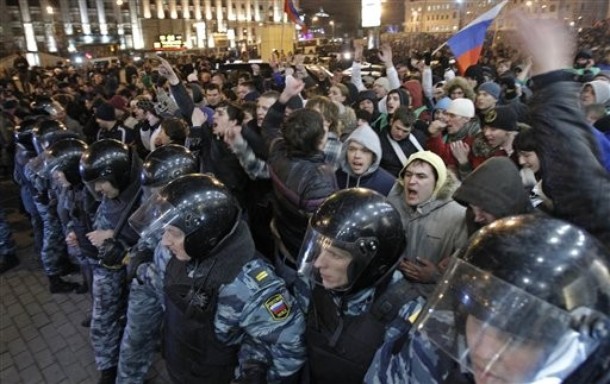The Russian parliamentary elections may not be the start of another Russian Revolution, but they do prove that something is rotten in the state of Russia, and the Russian people know it. What is to be done?
Yesterday’s parliamentary elections returned Vladimir Putin’s United Russia party to the Duma with just under 50 percent of the vote, marking a drop of 14 points from the 2007 elections. This precipitous drop in support, which occurred despite widespread reports of electoral violations and outright fraud, is but the latest sign of the average Russian’s discontent with the “party of crooks and thieves.”
One clear and inescapable fact has emerged from these elections: despite controlling the televised news media, stuffing ballot boxes, arresting opposition leaders, brazenly harassing election monitors, and paying voters to vote for them, United Russia received less than 50 percent of the vote in elections in which their most potent adversaries were the Communist party and a man who wants to use nuclear weapons to flood Great Britain. This is not Mr. Putin’s greatest hour, nor is it the greatest hour of his co-ruler and presidential seat-warmer Dmitri Medvedev.
Russia-watchers, debating the consequences of this embarrassment, have come to a few conclusions about its greater significance. First, it exhibits the Russian people’s growing lack of patience with the state of the nation, and as a recent public booing of Mr. Putin demonstrates, they increasingly lay the blame for Russia’s endemic political corruption, economic stagnation, and continuing public health crisis at his feet. Second, many say the elections will serve as a warning call to the Kremlin, which will now likely increase social expenditures and spare no expense and forgo no tactic, no matter how low, dirty, or illegal, in order to secure Putin’s return to the Presidency next year. Finally, as Brian Whitmore writes at The Power Vertical, his Kremlin-watching blog, the elections illustrate that “nothing has changed and everything has changed.”
Nothing has changed in that from a practical standpoint, Mr. Putin is not significantly hindered from implementing any policy he desires. While United Russia now holds a mere plurality in the Duma, two of the other three parties in parliament, A Just Russia (which was formed as a leftist, pro-Kremlin party, with the blessing of the current government) and the ironically named Liberal Democrats (which represent Russia’s ultra-nationalist right wing—see the atomic bomb initiated flooding of Britain strategy, mentioned above) consistently vote with the Kremlin anyway. The only other party represented in the Duma is the aging Communist party, which carried 20 percent of the vote. Russia’s most prominent liberal party, Yabloko (which is Russian for “apple”) didn’t even clear the 7 percent threshold required for representation. There are no liberals in Russia’s new Duma, and aside from the anachronistic Communists, there is barely an opposition. It says a great deal about Russia’s current political situation that elections which the ruling party stole with mild, but not astounding, success have excited promoters of Russian democracy.
Yet there is something fundamentally and qualitatively different about a Russia in which Russian mixed-martial arts fans openly jeer Vladimir Putin (who holds a black belt in Judo), in which citizens carefully document electoral violations using smartphones and Twitter, and in which thousands of Russians take to the streets (as they did Monday night) to showcase their rage at having the future of their country, and their right to modernity, stolen once again.
This change is promising. It demonstrates that Russia’s students and young professionals are not the complacent, downtrodden masses they have been portrayed as time and time again. It demonstrates that despite the many failed Russian revolutions of the past, the Russian people still have the potential to stand in contrast to their history and demand real change for the better.
However positive this change may be, it is still important that analysts take a step back and understand its true scale. Yes, this has been an embarrassment for the regime, and yes, average Russians are taking a newly assertive stance on corruption, but they are hardly about to sweep the regime out of power in the manner of the Tunisians or the Egyptians. According to independent polling, Mr. Putin, booing aside, still enjoys an enviable approval rating in the sixties—lower than his previous, astronomically high ratings in the eighties, but still high. They will likely remain high for some time, as the television stations from which most Russians still receive their news are all controlled by pro-Kremlin forces (though we may expect those ratings to fall as the internet surpasses television as Russians’ main source of media consumption).
Even if Russians were inclined to demand a swift end to Putin’s political career, what opposition stands waiting to take power? The Orange Revolution cannot be repeated in Russia, for there is no legitimate liberal challenger around which critics of Mr. Putin may rally. Legal and structural barriers prevent all but those parties approved by the Kremlin from taking power, leaving voters to choose between parties of the far left and far right. Even if those obstacles are overcome, the Russian economy is still essentially composed of extractive resource and arms manufacturing industries, both of which are dominated by the sort of state owned enterprises which are the backbone of other successful, transparent democracies such as Venezuela, Nigeria, and Saudi Arabia. Serious reforms to Russia’s economy and civil society are needed before liberal democracy can survive in Russia for the long term.
Much work remains to be done before Russia is finally rid of the succession of parasitic regimes which have defined her history thus far. These elections have shown that it is possible Russia may one day join the rest of Europe as a free, proud, and prosperous nation stretching from the Baltic to the Pacific; unfortunately, they have also demonstrated that Russia’s long path to reform has many pitfalls.
Dean Jackson is an intern with the Atlantic Council’s Office of External Relations.
Image: russiaprotest.jpg
